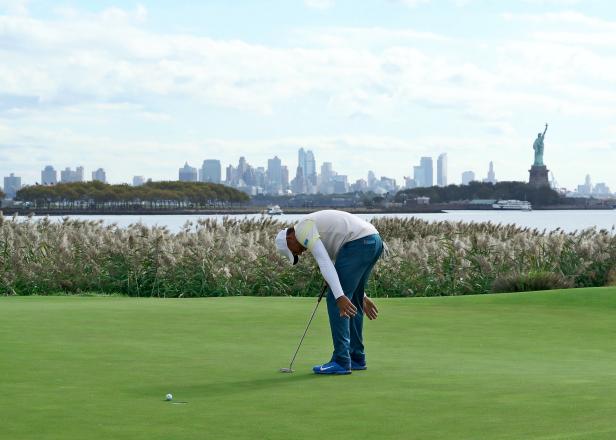Products You May Like
Let’s take a step back and consider what it means to slice a putt. It’s no different than slicing a drive: The club cuts across the ball from out to in with the clubface open. And just like with the driver, the result is a weak shot that veers off line. The difference in putting is, instead of the mid-air theatrics of a ball peeling into the trees, the sliced putt simply comes up short and to the right of where you wanted (for righties). Less dramatic, but no less frustrating.
Why does this happen? If you’re like a lot of golfers, you watch your putts roll by lifting your head and turning your body toward the hole. When the shoulders rotate open, the club gets dragged with them on an out-to-in path. That sounds like a pull, right? Well, it would be if the putterface were square to that path, but it’s usually open when you cut across the ball. That means a glancing strike with an open clubface—and a putt that misses short and low.
By contrast, picture how the pros watch their putts. They stay in their posture and swivel their heads so their eyes can track the ball. Jack Nicklaus is one that comes to mind—how he stayed in his trademark putting posture for so long—or Jordan Spieth today. Like all the great putters, they know that a stable body is crucial to consistency on the greens.
You might be thinking, Why does it matter if I turn to the hole after the ball is gone? Because you’re starting to turn before impact; you’re already halfway out of your posture by the time the putter meets the ball. The fix here—the one thing I want you to think about—is staying down and keeping your body square.
Here are two drills to work on.
First, hit some three-footers left-hand-only with your right hand holding your left shoulder in place. If the left shoulder stays down, you’ll swing the putter toward the hole. You can also do this drill with your left hand choked down so the grip is against the forearm. That gives the sensation of your left arm and the putter moving together down the line with the face square. After a while, putt normally and strive for the same feel.
For a second drill, set up five feet from a hole and place a ball marker just behind your ball. The marker should be partially hidden when you take your address.
Practice hitting putts focusing on seeing the ball move away from the marker. This drill will keep your head down a fraction longer and help the putterhead swing on a straight path with a square face.
These practice drills will help you stop peeking too soon. Once you calm the instinct to chase the ball with your eyes, you can focus on swiveling your head toward the target, like the pros do. Know what else you’ll be doing like the pros? Pulling the ball out of the hole.
Todd Anderson, a Golf Digest Teaching Professional, is the director of instruction for the PGA Tour Performance Center at TPC Sawgrass in Ponte Vedra Beach.


